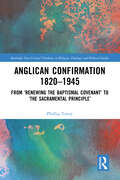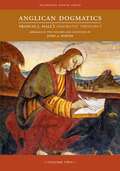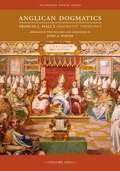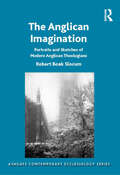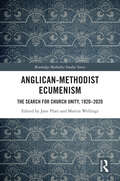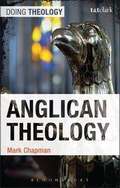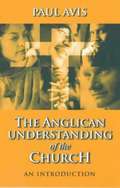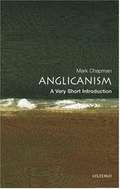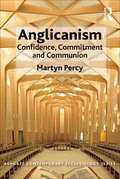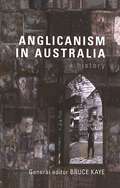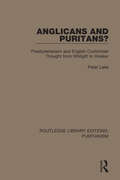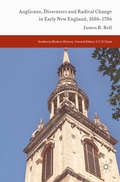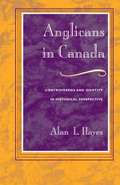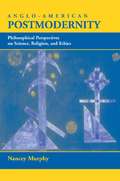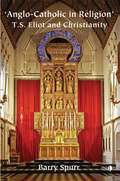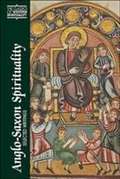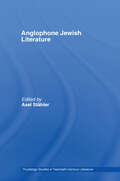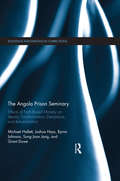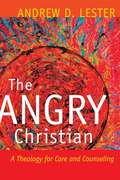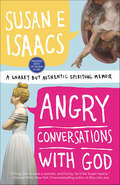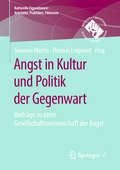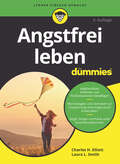- Table View
- List View
Anglican Confirmation 1820-1945: From ‘Renewing the Baptismal Covenant’ to ‘The Sacramental Principle’ (Routledge New Critical Thinking in Religion, Theology and Biblical Studies)
by Phillip ToveyThis book focuses on Anglican Confirmation in theology, liturgy, and practice from 1820 to 1945. This was a period of great change in the ways Anglicans approached Confirmation. The Tractarian movement transformed the Communion, and its ideas were carried overseas with the missionary movement. The study examines the development of a two-stage theology and its reception. It analyses the wave of liturgical revision expressed in England in the 1928 Prayer Book. It explores the episcopal changes in practice from the eighteenth-century paradigm to a new way of confirming. The revolution of the time has left a legacy that still informs practice, while doubts about theology and its liturgical application have left an existential crisis. The author reflects on how the current situation in various provinces has its roots in this period and the diffusion of ideas in the Communion. The book offers a fresh systematic examination of the neglected ecclesial practice of Confirmation, providing a more holistic view and clarifying developments to help us better understand the present. It will be of particular interest to scholars of Christian theology, liturgy, ecclesiology, and church history.
Anglican Dogmatics (Dogmatic Theology #2)
by Francis J. HallIN THIS VOLUME: <p><p>BOOK VI: The Incarnation <p>BOOK VII: The Passion & Resurrection of Christ <p>BOOK VIII: The Church & The Sacramental System <p>BOOK IX: The Sacraments <p>BOOK X: Eschatology <p><p> From the Prolegomena of the Editor: <p> The original advertisement for the publication of Francis J. Hall’s Dogmatic Theology in ten volumes by Longmans, Green and Company characterized it as “the long-desired Anglican Summa of doctrine, designed to constitute a connected treatment of the entire range of Catholic Doctrine,” making an implicit comparison to the magisterial Summa Theologicae (Summary of Theology) of St. Thomas Aquinas. The two are of roughly similar length, but it is in terms of comprehensiveness that the latter most resembles the former. Hall does for Anglicans what Aquinas did for Roman Catholics: systematize the contents of the Faith as taught by the Church and confirmed by the Scriptures. <p><p> Regrettably, this compendium of Anglican—and therefore, Catholic—doctrine is little known, and even less consulted, one hundred years after its publication. After more than twenty years in the priesthood, I would likely never have heard of it had not an Anglo-Catholic parishioner commended it to me. Its present obscurity is no doubt due to its being out of print for long periods, as well as to the unwieldiness of its 3,198 (!) pages. This slightly abridged and fully annotated edition is intended to remove both of these obstacles to its accessibility. <p><p> My editorial work has been primarily in service of slightly condensing the original to reduce it from ten compact tomes to two full-sized volumes, a goal made attainable in large part by typesetting and formatting changes. I have omitted text only in those rare instances when I judged it to be either unnecessarily redundant, overly technical, or anachronistic in illustration or application—or when Hall enters into debate with his contemporaries on some issue of the day. In all such cases, I have used ellipses enclosed in square brackets to indicate that material is missing. Whenever sentences or paragraphs seemed to me peripheral to the flow of Hall’s argument, tangential to the subject under discussion, or parenthetical in nature, but still important enough to retain, I have converted them into smaller-print footnotes as a means of conserving space. Headings for sections (marked with §) within chapters are taken from the original table of contents for each Book, and all paragraph divisions within the sections themselves have been eliminated. <p><p> For their part, the original footnotes have been drastically reduced in number and considerably shortened in length by eliminating all references to contemporaneous theological literature, on the assumption that the large majority of those sources, whatever their historical value, are likely to be of little interest to twenty-first-century readers, especially non-specialists. On the other hand, all cross-references and all attributions to (1) theologians of the undivided Church, (2) the works of medieval authors (especially Aquinas’s Summary), and (3) post-reformational English divines (such as Richard Hooker) have been retained as essential to the Catholic character of what I have called—in venturing a distinctive title for this abridgement—“Anglican Dogmatics.”
Anglican Dogmatics: Francis J. Hall's Dogmatic Theology
by Francis J Hall John A Porter Thomas HoltzenThe original advertisement for the publication of Francis J. Hall’s Dogmatic Theology in ten volumes by Longmans, Green and Company characterized it as “the long-desired Anglican Summa of doctrine, designed to constitute a connected treatment of the entire range of Catholic Doctrine,” making an implicit comparison to the magisterial Summa Theologicae (Summary of Theology) of St. Thomas Aquinas. The two are of roughly similar length, but it is in terms of comprehensiveness that the latter most resembles the former. Hall does for Anglicans what Aquinas did for Roman Catholics: systematize the contents of the Faith as taught by the Church and confirmed by the Scriptures. Regrettably, this compendium of Anglican—and therefore, Catholic—doctrine is little known, and even less consulted, one hundred years after its publication. After more than twenty years in the priesthood, I would likely never have heard of it had not an Anglo-Catholic parishioner commended it to me. Its present obscurity is no doubt due to its being out of print for long periods, as well as to the unwieldiness of its 3,198 (!) pages. This slightly abridged and fully annotated edition is intended to remove both of these obstacles to its accessibility. My editorial work has been primarily in service of slightly condensing the original to reduce it from ten compact tomes to two full-sized volumes, a goal made attainable in large part by typesetting and formatting changes. I have omitted text only in those rare instances when I judged it to be either unnecessarily redundant, overly technical, or anachronistic in illustration or application—or when Hall enters into debate with his contemporaries on some issue of the day. In all such cases, I have used ellipses enclosed in square brackets to indicate that material is missing. Whenever sentences or paragraphs seemed to me peripheral to the flow of Hall’s argument, tangential to the subject under discussion, or parenthetical in nature, but still important enough to retain, I have converted them into smaller-print footnotes as a means of conserving space. Headings for sections (marked with §) within chapters are taken from the original table of contents for each Book, and all paragraph divisions within the sections themselves have been eliminated. For their part, the original footnotes have been drastically reduced in number and considerably shortened in length by eliminating all references to contemporaneous theological literature, on the assumption that the large majority of those sources, whatever their historical value, are likely to be of little interest to twenty-first-century readers, especially non-specialists. On the other hand, all cross-references and all attributions to (1) theologians of the undivided Church, (2) the works of medieval authors (especially Aquinas’s Summary), and (3) post-reformational English divines (such as Richard Hooker) have been retained as essential to the Catholic character of what I have called—in venturing a distinctive title for this abridgement—“Anglican Dogmatics.”
The Anglican Imagination: Portraits and Sketches of Modern Anglican Theologians (Routledge Contemporary Ecclesiology)
by Robert Boak SlocumThe variety and depth of Anglican theology is best engaged through personal encounter with its many sources - the theologians and theological witnesses themselves. Anglican theology is often worked out in personal terms that provide a synthesis between reflection on the truths of faith and the particular contexts of culture and life. This book presents modern Anglican theology through a unique ’gallery’. This theological gallery includes a portrait or sketch of ten Anglican writers - DuBose, Farrer, Stringfellow, Brooks, Kemper, DeKoven, McCord Adams, Polkinghorne, Gore and Macquarrie. Theological description, interpretation and application are included for each, with the presentations differing as widely as the theologians and theological witnesses themselves. Drawing together understandings and experiences of faith, this will be an invaluable resource for students of Anglican theology and anyone who seeks to understand the distinctive perspectives and contributions of Anglicanism relative to living faith and daily life.
Anglican-Methodist Ecumenism: The Search for Church Unity, 1920-2020 (Routledge Methodist Studies Series)
by Jane Platt and Martin WellingsThis book offers a detailed analysis of one of the key episodes of twentieth-century ecumenism, focusing on the efforts made to reconcile the Church of England and the Methodist Church of Great Britain in the years since the First World War. Drawing on newly available archives as well as on a broad range of historical, theological, and liturgical expertise, the contributions explore what was attempted, why success proved elusive, and how the quest for unity was reconfigured into the twenty-first century. The volume sets contemporary ecumenical ambitions in historical context, explains the origins, course, and aftermath of the Anglican–Methodist ‘Conversations’ of 1955–72, retrieves their enduring global legacy, and explores the fraught nature of the ecumenical quest. It will be of key interest to scholars with an interest in ecumenism, Methodist studies, and church history.
Anglican Theology (Doing Theology)
by Mark D. ChapmanThis book seeks to explain the ways in which Anglicans have sought to practise theology in their various contexts. It is a clear, insightful, and reliable guide which avoids technical jargon and roots its discussions in concrete examples. The book is primarily a work of historical theology, which engages deeply with key texts and writers from across the tradition (e.g. Cranmer, Jewel, Hooker, Taylor, Butler, Simeon, Pusey, Huntington, Temple, Ramsey, and many others). As well as being suitable for seminary courses, it will be of particular interest to study groups in parishes and churches, as well as to individuals who seek to gain a deeper insight into the traditions of Anglicanism. While it adopts a broad and unpartisan approach, it will also be provocative and lively.
The Anglican Understanding of the Church: An Introduction
by Paul AvisA clear and readable introduction to the distinctive Anglican understanding of the Church, its origins, beliefs, structure, form and function, what it has in common with other churches and where it differs.
Anglicanism: A Very Short Introduction
by Mark ChapmanWhat is Anglicanism? How is it different from other forms of Christianity, and how did it come to have so many different versions throughout the world? Although originally united by location and a common belief, Anglicanism has gradually lost its preeminence as the English state church due to increasing pluralisation and secularisation. While there are distinctive themes and emphases which emerge from its early history and theology, there is little sense of unity in Anglicanism today. In Anglicanism: A Very Short Introduction, Mark Chapman highlights the diversity of contemporary Anglicanism by exploring its fascinating history, theology, and structures. Putting the history and development of the religion into context, Chapman reveals what it is that holds Anglicanism together despite the recent crises that threaten to tear it apart.
Anglicanism: The Thought and Practice of the Church of England
by Paul Elmer More Frank Leslie CrossThe Anglican Faith, The Church, Separated Churches,The Bible, Standards of Faith, Natural Theology, Revealed Theology, Soteriology, Eschatology, The Christian Ministry, The Sacraments, Baptism and Confirmation, The Eucharist Other Religious Practices, Prayer, Ethics, King and State, Visitations, Caroline Piety.
Anglicanism: Confidence, Commitment and Communion (Routledge Contemporary Ecclesiology)
by Martyn PercyThis focused concentration and celebration of Anglican life could not be more timely. Debates on sexuality and gender (including women bishops), whether or not the church has a Covenant, or can be a Communion, and how it is ultimately led, are issues that have dominated the ecclesial horizon for several decades. No book on Anglicanism can ever claim to have all the answers to all the questions. However, Martyn Percy’s work does offer significant new insights and illumination - highlighting just how rich and reflexive the Anglican tradition can be in living and proclaiming the gospel of Christ. These essays provide some sharply-focused snapshots of contemporary Anglicanism, and cover many of the crucial issues affecting Anglicans today, such as the nature of mission and ministry, theological training and formation, and ecclesial identity and leadership. Church culture is often prey to contemporary fads and fashion. Percy’s work calls Anglicanism to deeper discipleship; to attend to its roots, identity and shape; and to inhabit the world with a faith rooted in commitment, confidence and Christ.
Anglicanism In Australia: A History
by Kaye, BruceThis benchmark work is unlike anything previously attempted. It is the first comprehensive national history of Anglicans in Australia. Anglicanism in Australia is an important contribution to our social history. Its authors have moved beyond biography and histories of individual congregations to create a broad, complex, layered history. They assess Anglicanism's contribution to Australian social, political and cultural life. They explore the processes by which a highly centralised English institution has been reshaped by the environment and experience of this country. The book begins with a fascinating and thoroughly researched narrative account-which moves from the arrival with the First Fleet of an Anglican chaplain, right through to the 1990s. Along the way it charts, among many other events, the nineteenth-century church buffeted by the pendulum swings of 'state aid'; the nationalistic fervour of wartime, and the political radicalism of the 1960s. In its second half, Anglicanism in Australia looks at Anglicans dealing with a broad spectrum of issues: the family, questions of gender, Indigenous peoples, the visual arts, the search for a national identity. It acknowledges the wide variety of Anglican views and reveals how regional identity, a powerful force in many other areas of Australian life, has expressed itself both positively and negatively during the past two centuries. Anglicanism in Australia will be an indispensible research tool for Australian social historians, an invaluable general reference work and, above all, a treasury for those close to the Anglican Church or interested in church history. To find out more about Anglicanism in Australia visit The Anglican Church of Australia's website - http://www.anglican.org.au/
Anglicans and Puritans?: Presbyterianism and English Conformist Thought from Whitgift to Hooker
by Peter LakeOriginally published in 1988, this was the first full and scholarly account of the formal Elizabethan and Jacobean debates between Presbyterians and conformists concerning the government of the church. This book shed new light on the crucial disagreements between puritans and conformists and the importance of these divisions for political processes within both the church and wider society. The originality and complexity of Richard Hooker’s thought is discussed and the extent to which Hooker redefined the essence of English Protestantism. The book will be of interest to historians of the late 16th and 17th Centuries and to those interested in church history and the development of Protestantism.
Anglicans, Dissenters and Radical Change in Early New England, 1686–1786 (Studies in Modern History)
by James B. BellThis book considers three defining movements driven from London and within the region that describe the experience of the Church of England in New England between 1686 and 1786. It explores the radical imperial political and religious change that occurred in Puritan New England following the late seventeenth-century introduction of a new charter for the Massachusetts Bay Colony, the Anglican Church in Boston and the public declaration of several Yale 'apostates' at the 1722 college commencement exercises. These events transformed the religious circumstances of New England and fuelled new attention and interest in London for the national church in early America. The political leadership, controversial ideas and forces in London and Boston during the run-up to and in the course of the War for Independence, was witnessed by and affected the Church of England in New England. The book appeals to students and researchers of English History, British Imperial History, Early American History and Religious History.
Anglicans in Canada: Controversies and Identity in Historical Perspective
by Alan L. HayesFrom the first worship services onboard English ships during the sixteenth century to the contentious toughmindedness of early clergymen to current debates about sexuality, Alan L. Hayes provides a comprehensive survey of the history of the Canadian Anglican Church. Unprecedented in the annals of Canadian religious history, it examines whether something like an Anglican identity emerged from within the changing forms of doctrine, worship, ministry, and institutions. With writing that conveys a strong sense of place and people, Hayes ultimately finds such an identity not in the relatively few agreements within Anglicanism but within the disagreements themselves. Including hard-to-find historical documents, Anglicans in Canada is ideal for research, classroom use, and as a resource for church groups.
Anglo-american Postmodernity
by Nancey MurphyThe termpostmodernis generally used to refer to current work in philosophy, literary criticism, and feminist thought inspired by Continental thinkers such as Friedrich Nietzsche and Jacques Derrida. In this book, Nancey Murphy appropriates the term to describe emerging patterns in Anglo-American thought and to indicate their radical break from the thought patterns of Enlightened modernity. The book examines the shift from modern to postmodern in three areas: epistemology, philosophy of language, and metaphysics. Murphy contends that whole clusters of terms in each of these disciplines have taken on new uses in the past fifty years and that these changes have radical consequences for all areas of academia, especially in philosophy of science, philosophy of religion, and ethics.
Anglo-american Postmodernity
by Nancey MurphyThe term postmodern is generally used to refer to current work in philosophy, literary criticism, and feminist thought inspired by Continental thinkers such as Friedrich Nietzsche and Jacques Derrida. In this book, Nancey Murphy appropriates the term to describe emerging patterns in Anglo-American thought and to indicate their radical break from the thought patterns of Enlightened modernity.The book examines the shift from modern to postmodern in three areas: epistemology, philosophy of language, and metaphysics. Murphy contends that whole clusters of terms in each of these disciplines have taken on new uses in the past fifty years and that these changes have radical consequences for all areas of academia, especially in philosophy of science, philosophy of religion, and ethics.
Anglo-Catholic in Religion: T. S. Eliot and Christianity
by Barry SpurrBarry Spurr's eagerly-awaited, definitive study of T. S. Eliot's Anglo-Catholic belief and practice shows how the poet's religion shaped his life and work for almost forty years, until his death in 1965. The author examines Eliot's formal adoption of Anglo-Catholicism, in 1927, as the culmination of his intellectual, cultural, artistic, spiritual and personal development to that point. This book presents the first detailed analysis of the unique influence that Anglo-Catholicism's doctrinal and devotional principles, and its social teaching, had on Eliot's poetry, plays, prose and personal life. An informed presentation and discussion of Anglo-Catholicism at the time of Eliot's conversion and through the subsequent decades of his Christian faith and practice. Significant new material from correspondence and diaries which sheds light on Eliot's thought, poetry and prose. This book is essential reading for all scholars and readers of T. S. Eliot and his circle; for students and devotees of Anglo-Catholicism, and scholars of the interaction between literature and theology, especially in the twentieth century. It will also be of use to senior and Honours-level undergraduates and postgraduate research students working in the fields of Modernism and its principles and belief systems, and for students of religion, especially Western Christianity and Anglicanism.
Anglo-Saxon Spirituality: Selected Writings
by Robert BoenigA collection of writings dating from the mid-400s to the Norman Conquest introduce readers to the pagan/Christian spirituality of medieval Europe.
Anglophone Jewish Literature (Routledge Studies in Twentieth-Century Literature)
by Axel StählerAnglophone Jewish literature is not traditionally numbered among the new literatures in English. Rather, Jewish literary production in English has conventionally been classified as ‘hyphenated’ and has therefore not yet been subjected as such to the scrutiny of scholars of literary or cultural history. The collection of essays addresses this lack and initiates the scholarly exploration of transnational and transcultural Anglophone Jewish literature as one of the New English Literatures. Without attempting to impose what would seem to be a misguided conceptual unity on the many-facetted field of Anglophone Jewish literature, the book is based on a plurality of theoretical frameworks. Alert to the productive friction between these discourses, which it aims to elicit, it confronts Jewish literary studies with postcolonial studies, cultural studies, and other contemporary theoretical frameworks. Featuring contributions from among the best-known scholars in the fields of British and American Jewish literature, including Bryan Cheyette and Emily Miller Budick, this collection transcends borders of both nations and academic disciplines and takes into account cultural and historical affinities and differences of the Anglophone diaspora which have contributed to the formation and development of the English-language segment of Jewish literature.
The Angola Prison Seminary: Effects of Faith-Based Ministry on Identity Transformation, Desistance, and Rehabilitation (Innovations in Corrections #1)
by Michael Hallett Joshua Hays Byron R. Johnson Sung Joon Jang Grant DuweCorrections officials faced with rising populations and shrinking budgets have increasingly welcomed "faith-based" providers offering services at no cost to help meet the needs of inmates. Drawing from three years of on-site research, this book utilizes survey analysis along with life-history interviews of inmates and staff to explore the history, purpose, and functioning of the Inmate Minister program at Louisiana State Penitentiary (aka "Angola"), America’s largest maximum-security prison. This book takes seriously attributions from inmates that faith is helpful for "surviving prison" and explores the implications of religious programming for an American corrections system in crisis, featuring high recidivism, dehumanizing violence, and often draconian punishments. A first-of-its-kind prototype in a quickly expanding policy arena, Angola’s unique Inmate Minister program deploys trained graduates of the New Orleans Baptist Theological Seminary in bi-vocational pastoral service roles throughout the prison. Inmates lead their own congregations and serve in lay-ministry capacities in hospice, cell block visitation, delivery of familial death notifications to fellow inmates, "sidewalk counseling" and tier ministry, officiating inmate funerals, and delivering "care packages" to indigent prisoners. Life-history interviews uncover deep-level change in self-identity corresponding with a growing body of research on identity change and religiously motivated desistance. The concluding chapter addresses concerns regarding the First Amendment, the dysfunctional state of U.S. corrections, and directions for future research.
The Angry Christian: A Theology for Care and Counseling
by Andrew D. LesterIn this work, respected scholar Andrew Lester discusses and incorporates the newest behavioral research models, contemporary biblical and theological scholarship, constructivist philosophy, and narrative theory into a comprehensive pastoral theology of anger. In revisiting through the lens of theological anthropology the very subject that brought him to the forefront of scholarship in pastoral care, Lester presents engaging new material and innovative new methods of interventions for dealing with this often-confusing human emotion.
Angry Conversations with God: A Snarky but Authentic Spiritual Memoir
by Susan E. IsaacsDisillusioned, disenfranchised, and disinterested in anything churchy, Susan Isaacs knew of only one thing to do when she hit spiritual rock bottom at age 40. . . . She took God to couples counseling. In this cuttingly poignant memoir, Susan Isaacs chronicles her rocky relationship with the Almighty--from early childhood to midlife crisis--and all the churches where she and God tried to make a home: Pentecostals, Slackers for Jesus, and the über-intellectuals who turned everything, including the weekly church announcements, into a three-point sermon. Casting herself as the neglected spouse, Susan faces her inner nag and the ridiculous expectations she put on God--some her own, and some from her "crazy in-laws" at church. Originally staged as a solo show in New York and Los Angeles, ANGRY CONVERSATIONS WITH GODis a cheeky, heartfelt memoir that, even at its most scandalous, is still an affirmation of faith.
Angry Wind: Through Muslim Black Africa by Truck, Bus, Boat, and Camel
by Jeffrey TaylerTraveling by bus, airplane, in the back of trucks and on camel, the author travels through the most war-torn parts of Africa. The author answers such crucial questions as 'What do Muslims think of President Bush?' and 'Do all Muslims and Africans hate Americans?' Tayler travels through some of the most remote and war-torn parts of Africa to find out. From the corrupt dealings in Nigeria to the war-torn areas of Mali and Chad, the author shows us the beautiful humanity and heart-breaking inhumanity of man.
Angst in Kultur und Politik der Gegenwart: Beiträge zu einer Gesellschaftswissenschaft der Angst (Kulturelle Figurationen: Artefakte, Praktiken, Fiktionen)
by Susanne Martin Thomas LinpinselAngst ist nicht nur eine menschliche Grundemotion, sondern ein gesellschaftliches Phänomen. Jüngst wurde sie zum charakteristischen Gefühl westlicher Gegenwartsgesellschaften erklärt und insbesondere mit politisch regressiven Entwicklungen, allen voran dem Aufstieg des Rechtspopulismus, in Verbindung gebracht. Ausgehend von Befunden eines aktuell veränderten gesellschaftlichen Stellenwerts der Angst untersucht der Sammelband in interdisziplinärer Perspektive gegenwärtige Ursachen, Auswirkungen, Repräsentationen, Ausprägungen, Deutungen und Praktiken der Angst. Mithilfe unterschiedlicher konzeptueller, theoretischer und methodisch-empirischer Zugänge werden im Sinne einer interdisziplinären Gesellschaftswissenschaft der Angst die vielfältigen sozialen, politischen und kulturellen Bedeutungen der Angst in gegenwärtigen Gesellschaften beleuchtet.
Angstfrei leben für Dummies (Für Dummies)
by Charles H. Elliott Laura L. SmithViele Menschen leiden unter à ngsten - sei es Platzangst, Flugangst, Angst vor Zurückweisung, Angst vor dem Verlust des Partners oder Kindes oder Angst vor dem Verlust des Arbeitsplatzes. So unterschiedlich diese à ngste sind, eines haben sie gemeinsam: Sie beeinträchtigen das Leben der Betroffenen und ihrer Angehörigen enorm. »Angstfrei leben für Dummies« hilft mit Selbsttests und einfachen à bungen, einen Weg aus dem Teufelskreis von Angst und Sorgen zu finden. Dieser Ratgeber zeigt, wie Sie Ihren à ngsten Schritt für Schritt begegnen können und wie Sie sie schlieà lich überwinden und sich nicht mehr von ihnen beherrschen lassen.
